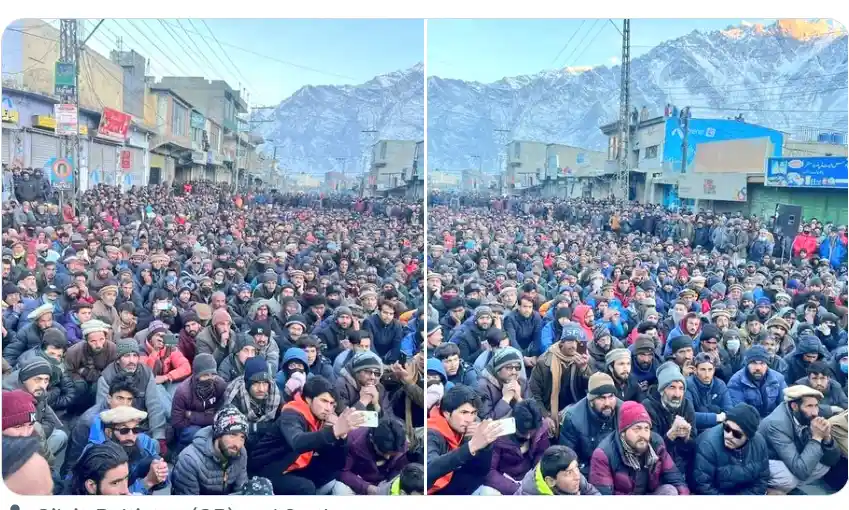

Massive protests erupt in a freezing Gilgit-Baltistan against Pakistani occupation (Photo: Twitter)
People in Pakistan-occupied Kashmir’s (PoK) Gilgit-Baltistan (GB) region have been holding widespread protests over the violation of their fundamental rights by Islamabad. Local political parties are supporting the protests over land rights, imposition of taxes, change in demographics and a severe power crisis.
The protests have continued for nearly nine days in a row in many parts of PoK including Skardu city.
In a tweet, Professor Sajjad Raja of the National Equality Party Jammu Kashmir Gilgit Baltistan and Ladakh (NEP JKGBL) said: “Gilgit Baltistan is the most deprived areas in Asia where ppl don’t have any political, economic & Basic Human Rights & are forced to live under the black laws of Pakistan. Ppl of Gilgit Baltistan are on the roads against Pakistani atrocities. Please Stand4GilgitBaltistan”.
PoK activist from Kashmir, Dr Amjad Ayub Mirza says that the people in PoK have called for solidarity with the people in India. The stifled people of PoK want Pakistan to provide them with basic freedoms—power, roads, development, reduced taxes as well as political representation.
For years, the local people have been asking for political representation as they do not have a parliamentary representative in the Pakistani parliament. Their lack of voice was further muffled after Pakistan launched the China Pakistan Economic Corridor (CPEC) under which their lands have been arbitrarily taken away for the massive infrastructure and connectivity project. Local residents are not represented in the federal government’s decision-making organisations and have no say in regional development initiatives under the CPEC.
In a recent report, the Voice of Vienna said that land grabbing and heavy taxes have triggered a widespread protest against the Pakistani Army. It says that the Human Rights Commission of Pakistan in its 2022 report highlighted how the law–’Khalsa Sarkar’ has violated human rights of the local people including the UN Declaration of the Rights of Indigenous Peoples, which also seeks to protect not just indigenous rights to natural heritage and knowledge systems but also their territories. Under the Khalsa Sarkar law, the government and the army can take over ‘barren or uncultivated lands’ even if these belong to the community.
PoK residents are also worried that the government in Islamabad is bringing about a demographic shift by settling in people from other provinces of Pakistan. With almost no say in development, and deprived of fundamental rights for decades political parties, social organisations and traders are holding demonstrations and have closed down markets in Skardu, Gilgit, Hunza and Ghizer despite the freezing temperatures.
The non-stop protests have caught international attention.
People in PoK are also worried that Pakistan’s bad governance, coupled with a weakening economy that is fast moving towards default, the politicians in Islamabad and the Pakistani Army will only intensify their stranglehold on the vast but neglected PoK region that lies on the border with India, China and Afghanistan. The people have now called to march to the Indian border in protest.
Read More: Watch: Massive anti-Pakistan protests rumble across Kashmir after Rajouri killings
Despite an uncertain and challenging global economic backdrop, the Indian economy remains a key driver…
Prime Minister Narendra Modi's upcoming five-nation tour, beginning on July 2, will see significant advancements…
Chief of the Army Staff (COAS) General Upendra Dwivedi on Monday departed on an official…
Western nations will not succeed in inflicting a "strategic defeat" on Russia, Russian Foreign Minister…
Israel has launched at least 50 aerial strikes across Gaza, with a significant focus on…
As part of its ongoing humanitarian support to Afghanistan, India recently hosted a five-day 'Jaipur…